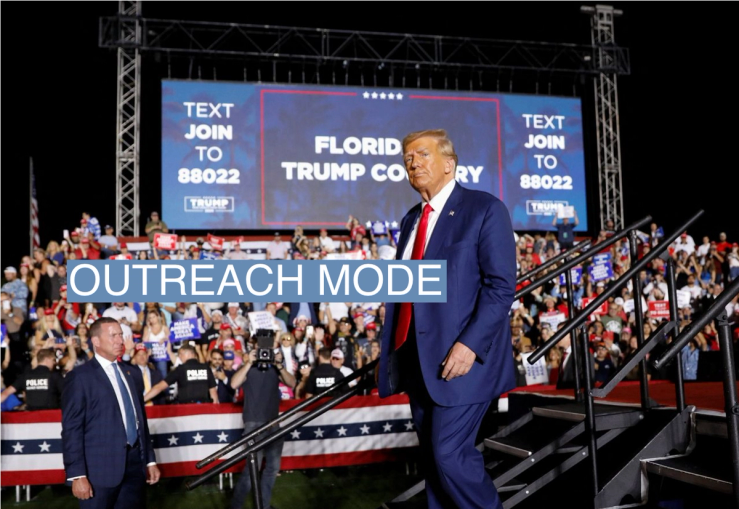Former President Donald Trump talked about turning “weaponized” government against his political opponents, defended his family separation policy, discussed the prospects for negotiations both between Israelis and Palestinians and the U.S. and Iran, and boasted about GOP gains with Latino voters in an interview with Univision set to air later today.
Semafor obtained a leaked early transcript of the interview, the network’s first since Trump booted Univision anchor Jorge Ramos out of a 2015 campaign event, an episode that did not come up in the conversation. Univision will run the hour-long taped interview between the former president and Enrique Acevedo on Thursday night at 10 PM ET.
The unusual structure of the interview has prompted some internal grumbling within Univision. According to multiple sources with knowledge of the situation, the interview was largely organized by Televisa, the giant Mexican media company that owns Univision. While Acevedo, a former Univision and CBS broadcaster, is one of Mexico’s most widely-respected television journalists, the decision to give an anchor from Televisa an hour in primetime is unusual, network sources said, and some Univision staff told Semafor they would have preferred if the interviewer was a member of Univision staff — who tend to be more engaged in American politics.
The sitdown with Trump was a priority for Televisia. Top Univision and Televisa executives including Univision CEO Wade Davis and Televisa co-CEOs Alfonso de Angoitia, and Bernardo Gomez were in attendance at the taping at Mar-a-Lago earlier this week.
On Latino voters. Trump was asked about recent Republican polling gains with Latino voters and said they were “entrepreneurial” and “want security” and that his message on the border was resonating.
“We have tremendous support from the, I call Hispanic Latino — you have lots of different, different terms, but it all means the same thing as far as I’m concerned,” he said in the transcript. “It’s, they’re just great people, incredible people.”
On Retribution. The Washington Post recently reported that Trump and his allies have been mapping plans to use the government to investigate former cabinet members who have criticized him, among other paths to pursue payback against critics and perceived enemies.
Trump was asked in his interview if, given his continuous accusations that the government was “weaponized” against him, he would pursue the same course against his opponents as president. He did not exactly rule it out, even raising the specter of ordering prosecutions in a future campaign (though Trump would be ineligible for re-election if he wins).
“Yeah. If they do this, and they’ve already done it, but if they follow through on this, yeah, it could certainly happen in reverse,” he said. “It could certainly happen in reverse. What they’ve done is they’ve released the genie out of the box.”
He added later: “They have done something that allows the next party — I mean, if somebody, if I happen to be president and I see somebody who’s doing well and beating me very badly, I say ‘Go down and indict them.’ They’d be out of business, they’d be out of the election.”
After the initial publication of this piece, a Trump aide said that the former president was not claiming that he was going to seek retribution against his political opponents, but attempting to make the point that a new precedent had been set by the Biden Department of Justice.
On Israel. Trump repeatedly suggested he would have pursued and succeeded in some kind of negotiation with Iran that would have prevented the 10/7 attack on Israel by Hamas, which is supported by Iran. “We would have had a deal with Iran,” he said. “Iran was broke, I say respectfully, they were broke.” At another point he said, “we were actually getting along well with Iran” when he was president and that they were in a weakened position that would have set them up for talks if he’d won in 2020.
He also softened his criticism of Prime Minister Benjamin Netanyahu, who he previously attacked for failing to anticipate the 10/7 plot and for, he alleged, not going along with his plan to kill an Iranian general. In the interview he called him “strong” and said he was capable of leading the country through the crisis. He did suggest Israel needed to sell its side of the conflict better. “I think Israel has to do a better job of public relations, frankly, because the other side is beating them at the public relations front,” he said.
Trump said he hadn’t given up on a potential peace deal between Palestinians and Israelis, saying he had previously argued with the late Republican megadonor Sheldon Adelson over whether it was possible. He also suggested that Palestinian hatred of Jews was deeply ingrained in Palestinian society, and Israeli hatred of Palestinians was a barrier as well.
“They learn to hate the Jewish people in the earliest forms of school, whatever their form of school is, but you know, Israel hatred,” he said. “There is no hatred like the Palestinian hatred of Israel and Jewish people. And probably the other way around also, I don’t know. You know, it’s not as obvious, but probably that’s it too. So sometimes you have to let things play out and you have to see where it ends.”
On Family Separation. Trump defended his policy of separating parents and children at the border, which sparked one of the largest outcries of his presidency before it was stopped by an executive order and court decision.
“When you hear that you’re going to be separated from your family you don’t come,” Trump said. “When you think you’re going to come into the United States with your family, you come.”
He continued: “We did family separation. A lot of people didn’t come. It stopped people from coming by their hundreds of thousands because when they hear family separation, they say ‘Well, we better not go.’”

